By LISA EISENHAUER
Executives at several Catholic health systems that have raised their minimum wages to $15 an hour in recent months say the move was driven by a desire to provide all workers a living wage as well as by the tight labor market.
Avera Health shifted to the higher minimum wage for all full- and part-time workers in May. The boost came just six months after the system raised its minimum wage to $14 and just a year and a half after it bumped the wage to $13.
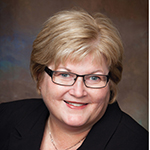
Jensen
Kim Jensen, Avera's chief human resources officer, noted that the system has approved the boosts even as the federal minimum wage has remained at $7.25 since 2009. In South Dakota, where Avera has its largest presence, the minimum wage has risen only to $9.45, despite being tied to increases in the cost of living.
"We said we need to have an Avera minimum," Jensen said. "It doesn't matter what the federal minimum or state minimums are, we've got to have our own minimums to be competitive and to make sure that we are rewarding our employees based on the work that they are doing."
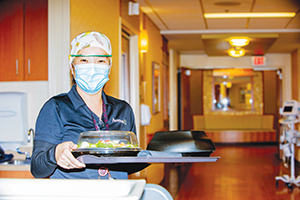
Thuyvan Nguye, a food service "ambassador" with Avera Health, delivers a meal. The system in May boosted its minimum wage to $15.
Jensen said Avera's latest bump in its lowest wage affected 9,000 workers in the five Upper Midwest states where the system has hospitals, clinics and long-term care centers. The increase prompted Avera to adjust its pay scales higher up, so many of the workers whose wages were affected already were making above the minimum. The system puts the annualized expense of the increase at $7 million.
Accelerating the process
Mercy announced its $15-an-hour minimum wage on Aug. 19. The boost will be fully implemented across the four Midwestern states where the system operates by Sept. 19.
Mercy said the pay increase is an $18 million annual commitment that will mean bigger paychecks for 6,000 workers, including those in housekeeping, food service, transportation and pharmacy.

Bentzen-Mercer
Cynthia Bentzen-Mercer, executive vice president and chief administrative officer, said Mercy put a program in place about six months ago to bring all co-workers up to the $15 minimum wage by 2023 then accelerated it.
Bentzen-Mercer said the change was speeded up because "at the core we feel it's the right thing to do" based on Mercy's Catholic mission to provide a livable wage to all staffers
The system adjusted wages further up the scale, too. The pay boost for Mercy workers who are affected will be on average $1 per hour and as much as $3 an hour for some, she said.
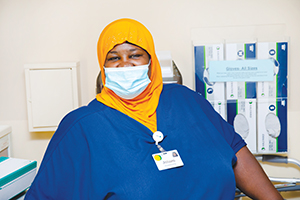
Johoro Shoble is a housekeeper with Avera Health. The system is one of several that have boosted its minimum pay for many workers in recent months.
Bentzen-Mercer acknowledged that with the jobless rate at 5.4% nationally, huge companies including Amazon, Costco and Target boosting their minimum wages to $15 an hour and entry-level workers in short supply, Mercy like many other employers is finding filling openings for low-skill jobs a challenge. She said the minimum wage boost is less about recruiting new workers than about dissuading those already on staff from leaving for jobs elsewhere.
"Our feeling is that we have incredibly talented co-workers who are a great fit for Mercy and who have a heart to serve and it's important that we're valuing them with a wage that they can better take care of their family and their loved ones," she said.
Banking on livable wages
CHI Saint Joseph Health, part of CommonSpirit Health, announced its $15 minimum wage on Aug. 17 effective immediately. The annual financial impact is $3 million for the system, which is based in Lexington and has 100 locations in 20 Kentucky counties.
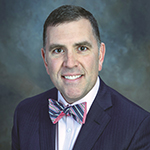
Houston
Tony Houston said that he made paying livable wages a focus for his leadership team when he became chief executive of CHI Saint Joseph Health in April.
"As Pope Francis said, 'We are all created with a vocation to work' and we at CHI Saint Joseph focus on being a great place to work," Houston said. "And so, when we reviewed our platform and foundation for being that great place to work, the team really rallied around ensuring we focused on providing a livable wage."
On average, the pay boost is $1.95 an hour, a 15% one-time bump for those on the lowest end of the system's pay scale. Houston said another increase could be warranted if the costs of housing, food and other expenses that figure into a livable wage rise and if the competition for workers remains strong.
"It's $15 today," he said. "We'll see where it goes in the future."
One incentive among many
One of the earlier adopters of a plan for a $15 minimum wage was Bon Secours Mercy Health. The system, which operates in seven Eastern and Midwestern states, announced its decision in December 2019 to have the wage boost phased in by 2022. That schedule was accelerated and the $15 minimum will be in place this fall.
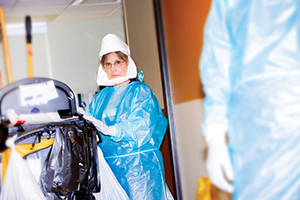
Barb Knudtson is on the housekeeping staff of Avera Health. The system's minimum wage boost in May is its third in about 18 months.
Once fully in place, the system said the increase would raise the wages of 14% of Bon Secours Mercy Health's 60,000 employees. It reflects a $17 million investment over three years, the system said.
"We are proud to provide our associates a dignified livelihood, which includes a competitive living wage, affordable access to health care, and other programs that support their well-being, in body, mind and spirit," Joe Gage, chief human resources officer for Bon Secours Mercy Health, said in the press release announcing the wage hike.
In addition to wages, the health system said in its 2019 announcement that its definition of a dignified livelihood includes "comprehensive and affordable medical coverage; generous paid time off; a well-being program for body, mind and spirit; LifeMatters work/life services for life's challenges; and comprehensive savings and retirement programs." LifeMatters is an employee assistance program.
Several systems noted that, once experience and other factors are figured in, many new hires start at well above their respective system's minimum wage even in positions that are at the lowest end of the pay scale.

Enebo
Kim Enebo, vice president of talent and rewards at Avera Health, pointed out that her system's entry-level wage boost isn't the only incentive it has rolled out to keep workers from being lured away. One that it started as a pilot in September 2020 was to offer nurses at some of its inpatient facilities up to $2,000 a year toward the principal on their student loans. The program proved so popular that Avera is now offering the same perk to all nurses.
"There's a lot of discussion right now on all sorts of things that we have not done in the past," Enebo said of Avera's efforts to recruit and retain workers.
More openings, fewer applicants
Even systems that aren't adopting a higher minimum wage are making use of other strategies and incentives to bring more workers onboard and keep the ones they have happy.
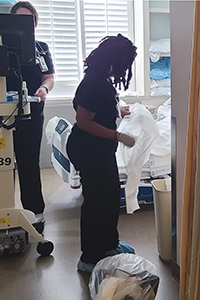
An environmental services worker cleans a patient room at a Mercy hospital. The system is boosting its minimum wage to $15 at facilities across its four-state footprint.
Greg Till, chief people officer at Providence St. Joseph Health, highlighted the difficult challenge health systems are facing. As an industry, health care is only filling 43% of positions posted, and turnover is at its highest point since the Bureau of Labor Statistics started measuring it.
At Providence St. Joseph Health, applications for openings are down by 25%. Despite this, Till says the system is making 25% more hires than ever to keep up with turnover and expanded services.
"We believe that our mission and our benefits and our pay are certainly calling health care professionals even though everybody in the industry right now is struggling with retention and hiring," he said.
Till said that while starting pay for most jobs in the majority of Providence St. Joseph Health's markets is $15 or above, the system hasn't set an across-the-board minimum rate for the five Western states where it operates. He said it has been regularly revising pay scales within markets and that most of those adjustments have been for entry-level jobs and for those at the low end of the scale. Providence also offers free or reduced cost benefits premiums for employees whose family income falls below four times the federal poverty limit, which is $105,000 for a family of four.
Enebo said the assessment of whether the $15 minimum wage needs further adjustment is ongoing at Avera. "We are looking at for this fall, do we need to go to $16. What's next? We're not done yet," she said. "We've got to continue to at least assess it along with our whole compensation review and planning."